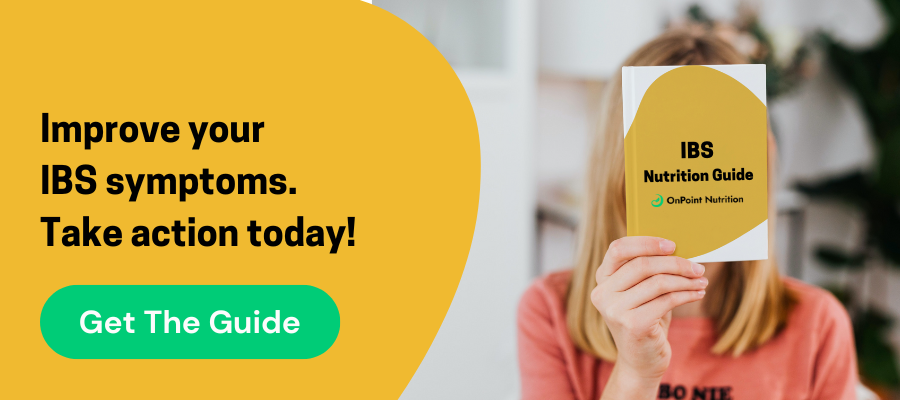
"What triggers my IBS?" is the golden phrase for anyone dealing with Irritable Bowel Syndrome (IBS). If you have been living with IBS for a long time, you know it is never as simple as one single trigger. In reviewing the research and summarizing our experiences working with clients, we bucket IBS triggers into three main categories: food, stress, and hormones.
IBS Triggers: Food
IBS is ultimately triggered because your food and drink irritates one/multiple organs within your gastro-intestinal tract: mainly your stomach, pancreas, large intestine, small intestine, and your backside. Many low-quality foods are IBS triggers; avoiding these is a no-brainer. However, the challenge is that sometimes even healthy foods can upset your digestive system. Remember that IBS triggers are different for each person, and that eliminating entire food groups may not be necessary for everyone. Start with these general tips:
- Core foods: Eat lean meat, cooked vegetables, and fruit (but only after removing the skin)
- Savory foods: If you're a foodie, you may also be able to enjoy hard cheeses (cheshire, pecorino style, blue cheese, harvati, or parmesan), as well as lactose-free yogurt and ice cream
- Practice Good Nutrition: Drinking fluids can alleviate your IBS symptoms. Additionally, try to incorporate more soluble fiber into your diet, bit by bit
Read our entire write-up on foods to eat if you have IBS!
Unfortunately, there is also a lengthy list of foods to avoid. Following our advice could save you a few anxious moments and stomach aches. The foods and eating patterns below are known IBS triggers:
- "Gassy" Vegetables: such as broccoli, cauliflower, cabbage, and beans
- High Fructose Fruits: such as apples and pears. And if you do have to eat these foods, remove the skin!
- High Lactose Foods: think dairy. Even if you do not have a full intolerance, it may be difficult for your body to digest milk, ice cream, and some cheeses
- Junk Food: carbonated beverages and soda, chewing gum (with artificial sweeteners), fried foods
- Spicy Foods
-
Large Meals: they're harder to digest and can cause cramping and diarrhea, a definite IBS trigger
Remember, everyone digests food differently. Foods that are IBS triggers for others may not impact you. It’s best to keep a food journal and work closely with a dietitian to figure out which foods trigger your IBS.
Read our entire write-up on foods to avoid with IBS!
IBS Triggers: Stress
Stress isn't the underlying cause of IBS, but it can trigger your symptoms or make them worse. If you are feeling stressed out, try a few of these strategies to bring yourself "back to center"
- Relaxation techniques or meditation: learn behavioral ways to camp yourself down if life gets you a bit worked up
- Disrupt the brain-gut connection: for some, minor physical discomfort causes mental over-stimulation. The result: a viscous cycle in which your brain causes your digestive system undue stress. Cognitive exercises such as constructive self-talk and decatastrophizing can break the cycle
- Other common-sense ways to reduce stress include: Regular exercise, consistent sleep,healthy diet (above), keep a journal, volunteer, find a new hobby, spend more time with friends
Managing stress looks different for everyone. However, when you are stressed, remember that your uneasiness could spread to your stomach. Several studies have shown that some people with IBS experience worse or more frequent signs and symptoms when they are stressed.
IBS Triggers: Hormones
Women are twice as likely to have IBS, which might indicate that hormones play a role with IBS. Many women report that their IBS symptoms are worse during their menstrual periods. To be clear, we are not suggesting that hormones are an IBS trigger, but that hormones may be one input to IBS flare-ups.
Taking estrogen for hormone replacement therapy, before or after menopause, is also a known risk factor for IBS and may prolong the condition later into life than it usually persists.
According to an article published in March 2014 in the World Journal of Gastroenterology, sex hormones such as estrogen may impact numerous GI functions, including digestive action, proper intestine functions (absorption and barriers), and activation of the immune system within intestinal lining.
The article found that sex hormones may also explain differences in the stress response between men and women (cue, everybody nods). This finding suggests that external cues may cause hormone changes and worsen IBS symptoms in some people.
Pregnancy is an extreme but helpful example. When women are pregnant, their bodies produce more estrogen and progesterone, which may be linked to:
- Reduced pain sensitivity, including digestive pain
- Worsening of constipation
On the other end of sexual processes, menopause often causes the following changes associated with a drop in female sex hormones:
- Reduced overall IBS symptoms
- Increased incidence of constipation
Managing IBS Triggers
Regulating hormone function is likely out of your control. However, merely knowing that hormones impact digestion and IBS makes you better prepared to deal with its impacts. We recommend making changes to your food routine one at a time. This makes it easier to make a lasting change. And who knows, once you've got your eating on point, you might notice that your stress levels naturally melt away. Let us know what you think!
To read more about foods to avoid, foods to eat, and how to make easy changes to your IBS diet to mitigate your symptoms, download our IBS Nutrition Guide.
Topics

Britney Kennedy is the founder and CEO of OnPoint Nutrition. Since opening in 2016, she and her team have helped over 2,500 individuals become happier, healthier more confident versions of themselves.



